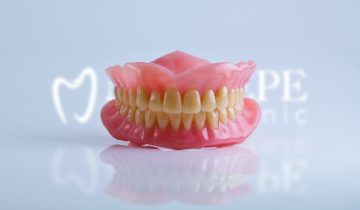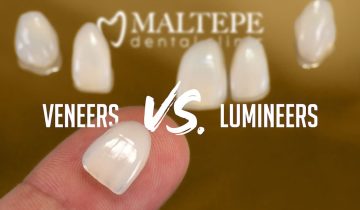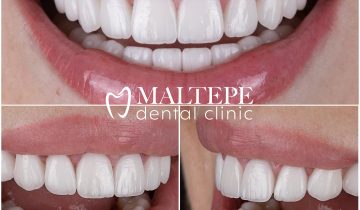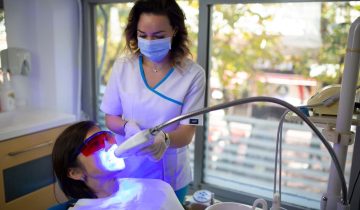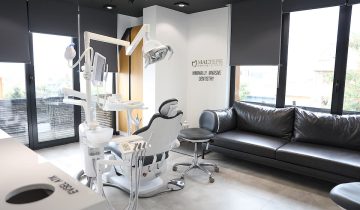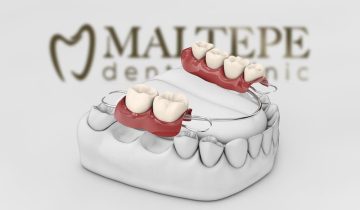Last updated on February 19th, 2024
The functionality and comfort are of great importance for denture wearers. Denture adhesives provide the patients with desired comfort and functionality. Although properly fixed dentures may not require any denture adhesive at first, the bone structure can change in time and a denture wearer loses the ideal alignment and stability. Also, some patients want peace of mind and extra security, and they use denture adhesives right after they wear dentures.
In this article, we will go through everything about denture adhesives. Starting from the definition of denture adhesive, you will learn about denture adhesive types, five popular denture adhesive brands in the market, key factors to consider, and some practical advice.
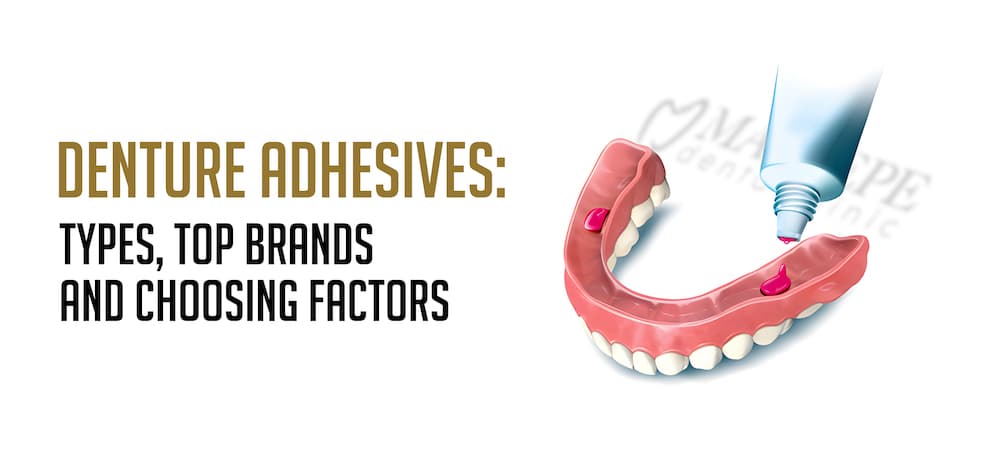
What Are Denture Adhesives?
Denture adhesives are products specially designed to improve the functionality and stability of dentures. They were introduced as early as 1913 but were recognized as a medical product only in 1935 by the American Dental Association (ADA).
They use three basic ingredients to formulize denture adhesives: adhesive agents, antimicrobial agents, and other agents. Adhesives make the denture-wearer feel safer and more confident. There are different types of denture adhesives such as creams, powders, strips, etc., and a lot of brands on the market for people.
What Are the Types Of Denture Adhesives?
The 4 types of denture adhesives are:
- Adhesive Creams
- Adhesive Powders
- Adhesive Strips
- Adhesive Pads
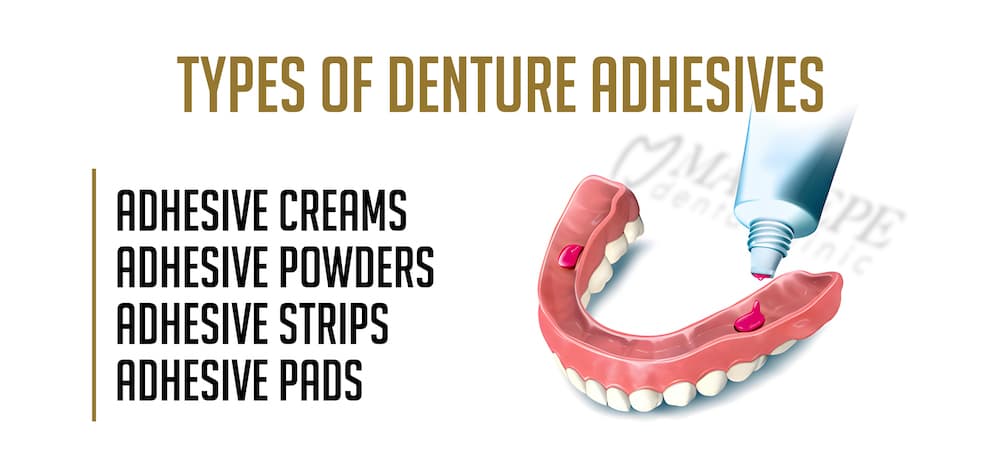
Adhesive Creams
Adhesives in the cream form are offered in tubes. Patients apply a small amount of cream adhesive on the denture and put it on the gum. Cream adhesives work effectively to stabilize the denture especially when the denture is fit properly.
How to use Adhesive Creams?
Here are the steps on how to use denture adhesive cream:
- Clean and dry your dentures thoroughly.
- Apply a thin strip of adhesive cream along the ridges of your dentures.
- Insert your dentures and hold them firmly in place for a few seconds to allow the adhesive to set.
- Remove your dentures and clean them thoroughly at the end of the day.
Adhesive Powders
Patients sprinkle the powder on the wet surface of their dentures. The powder is activated by the salvia and adheres to the wet gum surface. Similar to adhesive creams, adhesive powders work much better if the denture is placed properly.
How to use Adhesive Powders?
Here are the steps on how to use denture adhesive powder:
- Clean and moisten your dentures thoroughly.
- Sprinkle a thin layer of adhesive powder evenly over the ridges of your dentures.
- Insert your dentures and hold them firmly in place for a few seconds to allow the adhesive to set.
- Remove your dentures and rinse them thoroughly with warm water at the end of the day.
Adhesive Strips
Adhesive strips are made of non-toxic materials. They are placed between the denture and the gums. Adhesive strips are practical and convenient for many denture wearers. However, they work well with poorly fit dentures, and thus they can slightly change the bite alignment.
How to use Adhesive Strips?
Here are the steps on how to use adhesive strips:
- Clean and dry your dentures. Make sure your dentures are completely clean and dry before applying the strips. Any moisture or residue can interfere with the adhesive and make your dentures slip.
- Peel open the strips. Carefully peel open the package of adhesive strips. Avoid touching the sticky side of the strips.
- Apply the strips. Place the strips along the ridges of your dentures, not too close to the edges. Do not overlap the strips.
- Moist the strips. Lightly moisten the strips with water. This will help to activate the adhesive.
- Smooth out the strips. Use your fingers to smooth out any bubbles or wrinkles on the strips.
- Insert your dentures. Insert your dentures into your mouth and press them firmly into place. Hold them in place for a few seconds to allow the adhesive to set.
Adhesive Pads
Adhesive denture pads, also called adhesive denture cushions, are a great way to create the required suction to keep the dentures in place. They are soft, and they can easily adapt to patients’ gumline. They are easy to apply and remove with no mess left behind.
How to Apply Adhesive Pads?
Here are the steps on how to use denture adhesive pads:
- Clean and dry your dentures. Make sure your dentures are completely clean and dry before applying the pads. Any moisture or residue can interfere with the adhesive and make your dentures slip.
- Peel open the pads. Carefully peel open the package of denture adhesive pads. Avoid touching the sticky side of the pads.
- Apply the pads. Place the pads along the ridges of your dentures, not too close to the edges. Do not overlap the pads.
- Remove the foil from both sides of the pads.
- Press the pads firmly into place. Use your fingers to press the pads firmly into place on your dentures.
- Insert your dentures. Insert your dentures into your mouth and press them firmly into place. Hold them in place for a few seconds to allow the adhesive to set.
What Are the Top 5 Denture Adhesives?
Here are the top 5 denture adhesives:
- Effergrip Denture Adhesive Cream
- Fixodent Ultra Max Hold Dental Adhesive
- Corega Denture Adhesive Cream Original Extra Strong
- Holdtite Denture Powder
- Sea-Bond Secure Denture Lower Adhesive Seals
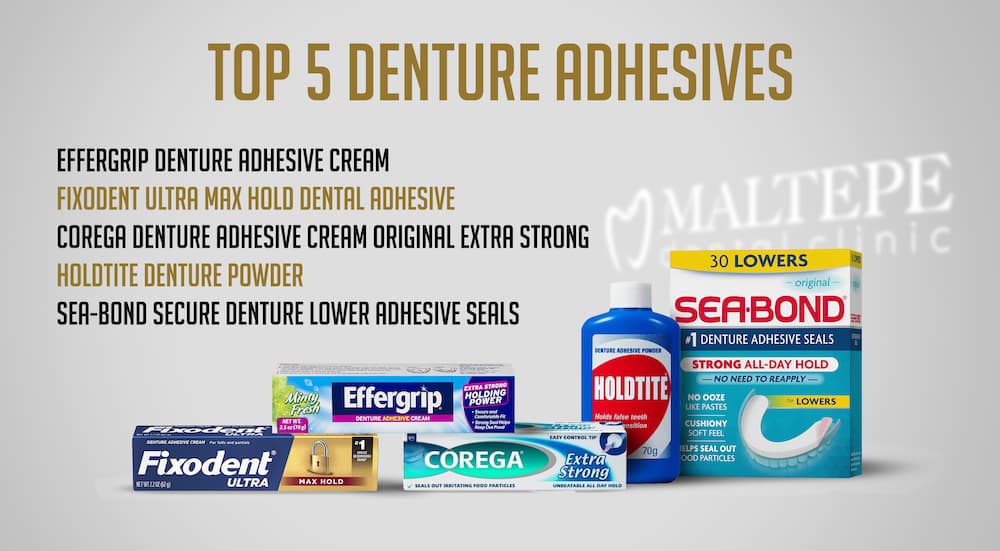
What are the Factors To Consider When Choosing An Adhesive?
Here are the key factors you should consider when choosing a denture adhesive:
- Holding Strength
- Duration Of Effectiveness
- Ingredients And Allergies
- Ease Of Application And Removal
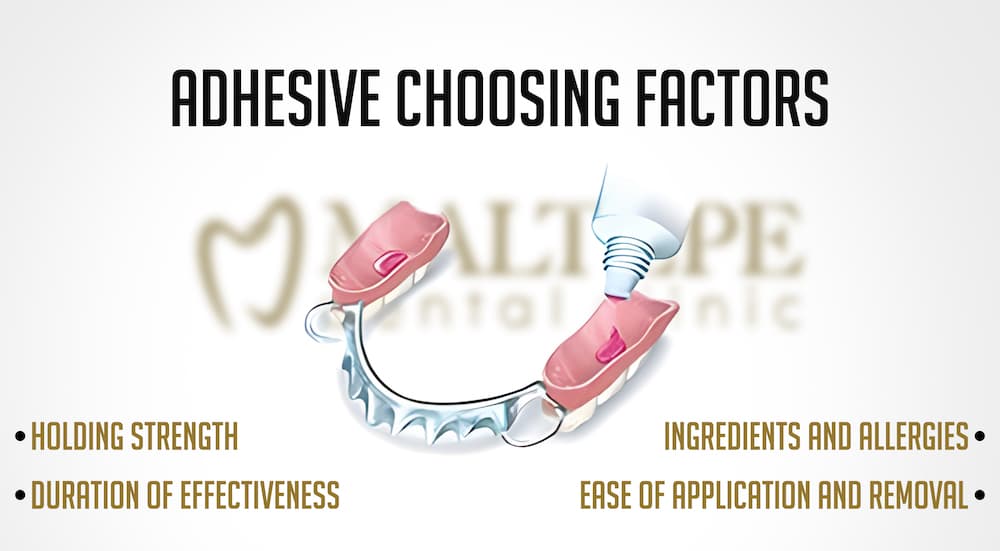
Holding Strength
The ability the provide holding strength is usually the biggest concern. An ideal denture adhesive should resist various conditions such as moisture, dryness, food particles…etc.
Duration Of Effectiveness
A stronghold is better when it lasts for many hours. An ideal denture adhesive should be effective for about 12 hours. Some adhesives last for 24 hours, but you should still consider resting your gums at night.
Ingredients And Allergies
Some denture adhesives contain harmful ingredients. Be aware of that and opt for healthier options such as zinc-free products.
Ease Of Application And Removal
A good denture should be applied and removed easily. Especially, some cream and powder adhesives might cause inconvenience for denture wearers.
How to Remove Denture Adhesive?
Here are the steps on how to remove denture adhesive:
- Swish your mouth with warm water. This will help to loosen the adhesive and make it easier to remove your dentures.
- Gently rock your dentures back and forth to loosen them. Do not try to force them out, as this could damage your gums.
- Once your dentures are loose, lift them out of your mouth. Be careful not to drop them.
- Rinse your mouth and dentures with warm water to remove any remaining adhesive. You can also use a soft-bristled brush to gently scrub your gums and dentures.
- Clean your dentures thoroughly with a denture cleanser. This will help to remove any remaining food particles and bacteria.
- Rinse your dentures with water and store them in a clean, dry container.
Find more information about cleaning dentures in the “How To Clean Dentures: The Best Cleaning Methods” blog post.
Who Shouldn’t Use Denture Adhesive or Glue?
Not everyone should use denture adhesive or glue. Here are some of the people who should avoid using it:
- People with sore gums or mouth sores. Denture glue can irritate sore gums and mouth sores, making them worse.
- People with allergies to any of the ingredients in denture glue. Denture glue can contain allergens such as latex, acrylic, and zinc. If you are allergic to any of these ingredients, you should avoid using denture glue.
- People with poorly fitting dentures. Denture glue is not a substitute for well-fitting dentures. If your dentures are loose or ill-fitting, they should be adjusted by your dentist.
- People with certain medical conditions. Some medical conditions, such as diabetes and HIV/AIDS, can make it difficult for your gums to heal. If you have one of these conditions, you should talk to your doctor before using denture glue.
If you are unsure whether or not you should use denture adhesive, talk to your dentist. They can help you decide if it is right for you and can teach you how to use it safely.
How to Keep Dentures in Place Without Adhesive?
Here are some tips on how to keep dentures in place without adhesive:
- Get a proper fit: Dentures are supposed to be custom-made to fit your mouth snugly. If they are too loose or too tight, they will be more likely to slip or move.
- Eat soft foods: Hard foods can be more difficult to chew and can put more pressure on your dentures, making them more likely to move.
- Avoid sticky foods: Sticky foods can get stuck to your dentures and make them more difficult to keep in place.
- Avoid using toothpicks or other sharp objects: These objects can damage your dentures and make them more likely to break or slip.
- Brush your dentures regularly: Brushing your dentures regularly will help to remove food particles and plaque, which can build up and cause irritation and discomfort.
- Use a denture grip: A denture grip is a device that fits over your dentures and helps to keep them in place.
- Use a denture lock: A denture lock is a device that attaches to your dentures and to your upper jaw to help keep them in place.
- See your dentist regularly: Your dentist can check your dentures for fit and make sure they are in good condition. They can also provide you with tips on how to keep your dentures in place.
FAQs for Denture Adhesives
How do denture adhesives work with full dentures?
Denture adhesives play a crucial role in securing full dentures and enhancing their functionality. When applied correctly, denture adhesives create a strong seal between the dentures and the gum ridges, preventing them from slipping or dislodging during everyday activities. This improved stability allows for confident chewing, speaking, and smiling.
To fully understand the mechanism of full dentures, please refer to our detailed blog post: “What Are Full Dentures?“
Which types of dentures benefit most from using denture adhesives?
Denture adhesives are particularly effective for full dentures, which are more likely to become loose or dislodged. Partial dentures may also benefit from denture adhesives if they are loose or ill-fitting. To learn more about the different types of dentures, please visit our blog post: “Different Types of Dentures: Which One Is Right For You?”
What Is The Best Adhesive For Bottom Or Lower Dentures?
For lower teeth secure stabilization is very important. The adhesive should be strong with no oozing during and after the application. Fixodent Complete Original offers the ease of precise application in addition to strong hold all day long.
What Is The Best Adhesive For Partial Dentures?
Fixodent Extra Hold is one of the best adhesives you can find on the market. It is in the form of powder and a thin layer of it is enough to provide perfect hold for your partial dentures.
What Is The Best Denture Adhesive Without Zinc?
Super Poligrip Free Denture Adhesive Cream is the best zinc-free adhesive.

